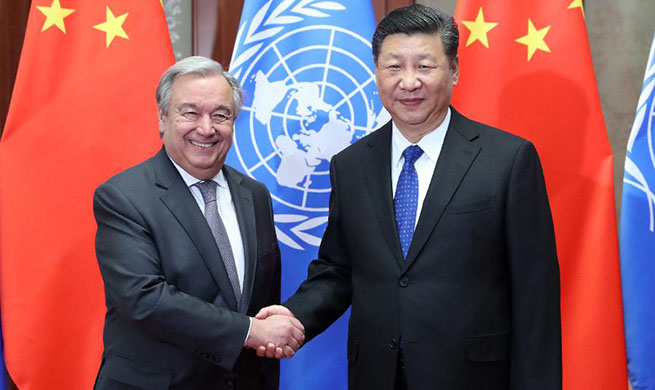by Keren Setton
JERUSALEM, April 8 (Xinhua) -- Past prosperity is fading in Tel Aviv's garment district, with bustling streets calming down and customers turning away from retail shops to online shopping, especially buying goods from abroad.
Many shops are closed, plastered with "For Rent" notices, and for those remain open, there is much time for the owners to drink coffee on the sidewalk. Clients are not rushing in.
In the 1970s, Israel's textile industry was at its peak, but it then hit a crisis, employing now only around 10,000 people.
The same has happened to Israel's retail industry. Both sectors are competing with a growing appetite of consumers to shop online.
The year 2011 is a changing point for the online shopping industry in Israel, when the government gave a value-added tax (VAT) exemption to online purchases from abroad.
The VAT exemption is one of the steps taken by the government when hundreds of thousands of Israelis took to the streets against the high cost of living seven years ago.
Slowly but surely, Israelis turned to virtual shopping, with a major increase in 2017.
Israel's postal company reported a record-breaking dispersal of 60 million packages last year, while the country has a population of approximately 8 million.
The number of packages is expected to grow to 100 million annually in the coming years.
The postal company recently announced the long-term rental of huge storage space in central Israel in order to cope with the influx of packages.
Uriel Lynn, president of the Federation of the Israeli Chambers of Commerce, lamented the situation and accused the government of discrimination.
"Whoever buys from foreign sources will not pay ... (VAT), while on the same product bought here locally, he will have to pay VAT, this is discrimination," Lynn said.
He believed the policy should be reversed in order to help both the textile and retail sectors in the country.
"Private consumption is really one of the real engines of growth in our country," Lynn said, adding that the policy is "not only directly destroying existing business but it really will have its mark on our total GDP."
However, other experts viewed the deline in retail and textile industries as a situation where "the economy is moving from more tradition manufacturing ... to more advanced industries ... that provide better employment opportunities," according to Gilad Brand, a researcher from the Taub Center for Social Policy Studies in Israel.
Brand added that the government should invest in better education and training for the population so that they will be able to undertake high level jobs in different sectors.
"This workgroup has mostly moved from low paying jobs in manufacturing to low paying jobs in trade and services," Brand said.
Last month, in attempt to raise awareness to their troubles, several hundred workers from the textile and retail sectors staged a protest against Israel's finance minister Moshe Kahlon.
Kahlon's main election promise was that he would lower the cost of living, but for the demonstrators, his policies come at their expense.
Avi Shichrur, a shop owner in Tel Aviv, said Kahlon only cares for Amazon and eBay, adding that "40 and 50-year-old businesses here are crashing, people are going home!"
Some of the shops posted on their store fronts that say "we are sorry to announce the firing of 400,000 workers."
Several Israeli fashion chains have filed for bankruptcy or are in different stages of insolvency.
A once robust industry is on a speedy decline, as Israel's economy is booming, and the incentive to help the crippled and shrinking sectors is low.
According to an economic survey released by the Organization for Economic Cooperation and Development last month, the Israeli economy "continues to register remarkable macroeconomic and fiscal performance." Unemployment is at an enviable low.
Dani Elharar is a small business owner who manufactures clothes. His shop is in Tel Aviv and he has small factories in northern Israel and in the West Bank.
As one of the leaders of the protest, he believed that the government must intervene to actively help revive the industry, and Israel cannot survive solely on its booming hi-tech sector.
The Israeli government has announced a plan to further eliminate tariffs on consumer goods, a move that will probably be another blow to the textile and local retail industry.
Israeli media has also reported that custom fees for packages under the value of 1,000 U.S. dollars may soon be scrapped.
The prospects for Elharar and his counterparts are not good.
As globalization deeps and e-commerce continues to grow, he and others will need to make the necessary adaptations in order to survive.

















